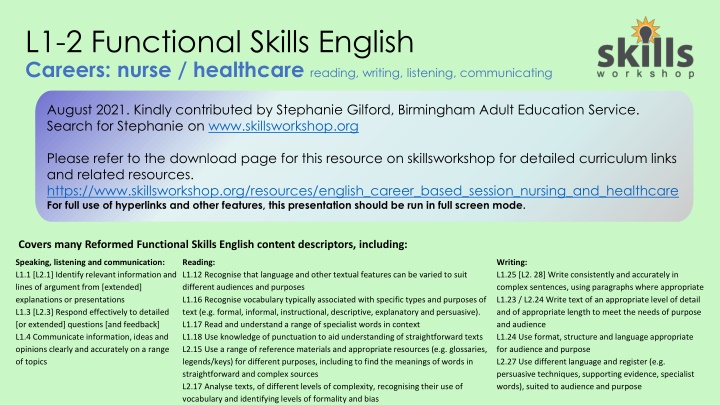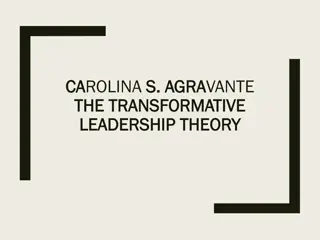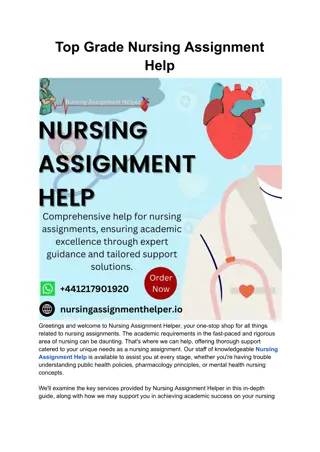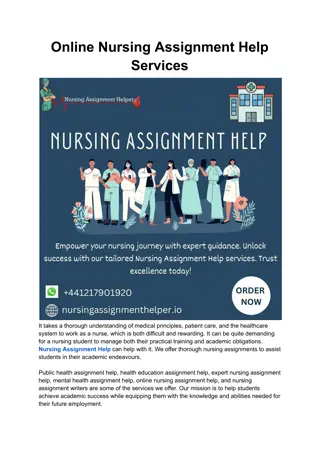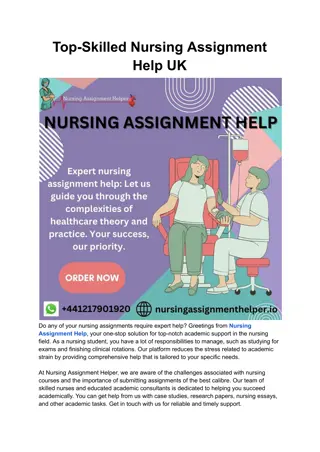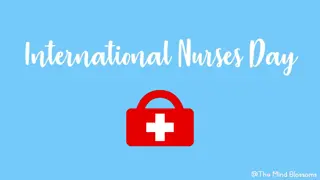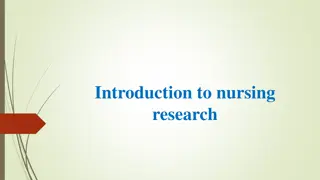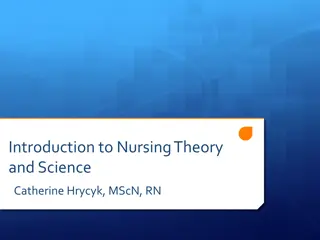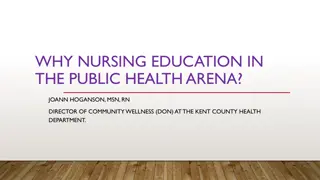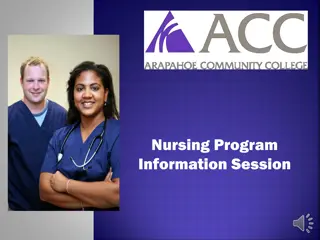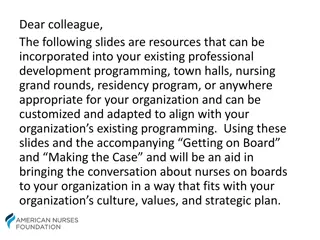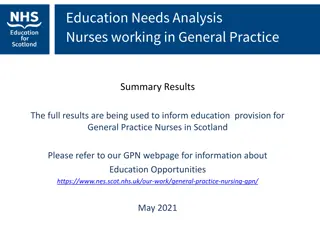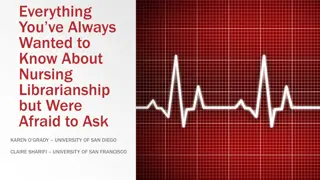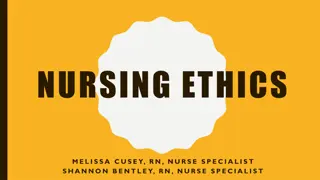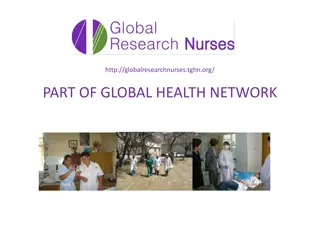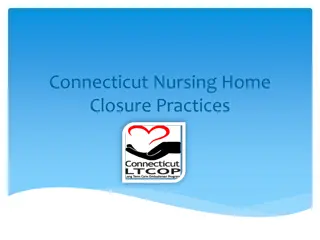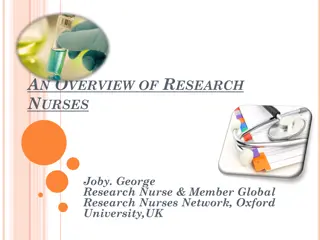Insights into the Nursing Career: What Nurses Wish They Had Known
Explore the firsthand experiences and insights shared by nursing experts regarding the challenges, misconceptions, and diverse opportunities within the healthcare profession. Discover the importance of critical thinking, autonomy, and the varied roles nurses play in different healthcare settings. Gain valuable knowledge on key vocabulary, skills transferability, and the rewards of working in nursing.
Download Presentation

Please find below an Image/Link to download the presentation.
The content on the website is provided AS IS for your information and personal use only. It may not be sold, licensed, or shared on other websites without obtaining consent from the author.If you encounter any issues during the download, it is possible that the publisher has removed the file from their server.
You are allowed to download the files provided on this website for personal or commercial use, subject to the condition that they are used lawfully. All files are the property of their respective owners.
The content on the website is provided AS IS for your information and personal use only. It may not be sold, licensed, or shared on other websites without obtaining consent from the author.
E N D
Presentation Transcript
Description: swlogo L1-2 Functional Skills English Careers: nurse / healthcare reading, writing, listening, communicating August 2021. Kindly contributed by Stephanie Gilford, Birmingham Adult Education Service. Search for Stephanie on www.skillsworkshop.org Please refer to the download page for this resource on skillsworkshop for detailed curriculum links and related resources. https://www.skillsworkshop.org/resources/english_career_based_session_nursing_and_healthcare For full use of hyperlinks and other features, this presentation should be run in full screen mode. Covers many Reformed Functional Skills English content descriptors, including: Speaking, listening and communication: L1.1 [L2.1] Identify relevant information and lines of argument from [extended] explanations or presentations L1.3 [L2.3] Respond effectively to detailed [or extended] questions [and feedback] L1.4 Communicate information, ideas and opinions clearly and accurately on a range of topics Reading: L1.12 Recognise that language and other textual features can be varied to suit different audiences and purposes L1.16 Recognise vocabulary typically associated with specific types and purposes of text (e.g. formal, informal, instructional, descriptive, explanatory and persuasive). L1.17 Read and understand a range of specialist words in context L1.18 Use knowledge of punctuation to aid understanding of straightforward texts L2.15 Use a range of reference materials and appropriate resources (e.g. glossaries, legends/keys) for different purposes, including to find the meanings of words in straightforward and complex sources L2.17 Analyse texts, of different levels of complexity, recognising their use of vocabulary and identifying levels of formality and bias Writing: L1.25 [L2. 28] Write consistently and accurately in complex sentences, using paragraphs where appropriate L1.23 / L2.24 Write text of an appropriate level of detail and of appropriate length to meet the needs of purpose and audience L1.24 Use format, structure and language appropriate for audience and purpose L2.27 Use different language and register (e.g. persuasive techniques, supporting evidence, specialist words), suited to audience and purpose
What is it like to be a nurse? Becoming a nurse/healthcare professional It s not easy to get a clear picture of this career without speaking to those who ve walked the walk. So, to help, we rounded up nursing experts to tell you what they wish they d known BEFORE becoming an RN. Key Vocabulary autonomy graduate Punctuation practice assess Why is the word BEFORE written in capital letters? What about RN ? critically think Language feature spotting implement Can you identify any language features in the paragraphs above? Misconceptions? What about you? What surprised me the most when I began working as an RN is the level of autonomy that you experience even as a new graduatenurse, says Sarah Pruitt. A lot of people mistakenly believe that nurses are there to follow whatever orders the doctors give us. While we also do that, nurses must also thoroughly assess a patient or situation, critically think and then implementthe plan of care. What do you want to do within the healthcare system? Is it working in nursing/midwifery/care/dentistry? Or something else? Why do you want to work in the healthcare system? What previous experience do you have? Text source: https://www.rasmussen.edu/degrees/nursing/blog/what-i-wish-someone-told-me-before-becoming-registered-nurse/
Key Vocabulary You re able to move into different areas while working as a nurse, so you never get bored. I ve worked in community nursing and on a ward, and I m currently working in intensive care, so it s really diverse and can chop and change at any time. I didn t have any experience in intensive care before I started but all of my skills are transferable, so I went to the interview and got the job. You don t get those kind of opportunities in many careers. community nursing intensive care physio Language feature spotting Stretch and challenge Tone Can you identify any language features in the paragraphs above? What does she mean when saying that it is a really diverse job? Is this text formal or informal and how do we know? Give examples from the text on this slide to support your answers. Stretch and challenge What does chop and change mean? I know a lot of people think nurses are just overworked and underpaid, and while I can definitely empathise with that statement, I wouldn t completely agree with it. There are loads of good aspects to nursing, so I don t think we should be too harsh on the career itself. It can be really fun and you re working on a big team of doctors, nurses, physios and all kinds of people from all walks of life, as well as your patients and their relatives. It offers such an unusual mix of people that you see every day, compared to, say, someone working in an office. Text source: https://www.stylist.co.uk/life/nhs-nurse-career-money-eu-brexit-london-hospital-doctor-patient-health/71402
A profession for all! Sentence structure We rely heavily on nurses from the EU too, but the percentage of nurses applying to work here has plummeted. Brexit is a huge part of that, and if I was an EU nurse, I d be put off from applying too. Can you identify a complex sentence from one of these paragraphs? Write your own complex sentence using the same conjunction on the theme of healthcare and nursing. I don t want them to be put off as I ve met some amazing nurses from the EU. They re so clever and knowledgeable. English isn t their first language and yet they re able to look after a critically ill patient and tell me everything I need to know about them. Stretch and challenge What does working flat out mean? Key Vocabulary plummeted It s hard because there can be a lot of pressure, and I know I can earn more money by doing extra shifts, so I have to be strict with myself or I ll end up having no life. If I m working flat out and doing a mixture of 12- hour night shifts, day shifts and overtime, it s difficult to switch off. It can make planning things with friends and family quite difficult one of my friends is getting married and wants to go bridesmaid shopping but we don t have any free weekends together until November. Emotionally though, I m quite good; I go to the gym, and I try to maintain a good work- life balance. I might think about work, but I don t let it affect me. Graphical user interface, application, Teams Description automatically generated Watch the video: 5 things I wish I knew before starting Nursing. What positives does she identify in the career? What tips does she give to help? Video source: https://www.youtube.com/watch?v=NJN7w7EzqS0 Text source: https://www.stylist.co.uk/life/nhs-nurse-career-money-eu-brexit-london-hospital-doctor-patient-health/71402
Research task Click on the link below: Being a nurse is very challenging and it s certainly not a career for someone who wants an easy ride. But if someone did want to become a nurse, I would tell them not to be put off by the things that are said, because they ll see otherwise when they start doing it. It s such a different, challenging and exciting job and I don t think we should keep putting it down. https://nationalcareers.service.gov.uk/job- profiles/nurse Find out more about being a care worker by answering the following questions: Make a list Stretch and challenge 1. What is the average annual salary? 2. How many hours can you expect to work typically? 3. Name three related careers listed on the website 4. What do you need to apply? 5. Where will you study to be a nurse? University or college? 6. Can you do an apprenticeship in nursing? 7. How could you apply to work as a nurse? What questions do you have about being a nurse? How could we find the answers to these questions? Write a paragraph of advice to someone wanting to become a nurse. Use the positives that have been identified in previous slides, while acknowledging some of the challenges. You may need to do some research first. Discussion point Thinking Read more What skills do you have? How many of them would help you to become a nurse? List phrases that we could use in a letter of application.
Writing task Write a letter of application for a place at university to study nursing, or a volunteer role as a nurse. In your letter, you should: Explain how you are qualified to be a nurse (or why you want to be a nurse if you re writing this application for university!) Identify the skills and qualities you have that will benefit you and the Describe any relevant experience you have (this does not have to be in the same sector!) Research tasks Use the internet to look up local colleges and universities and complete the activity sheet. What courses do you want to look at? Where would you like to study? What do you need to apply for these courses? How can you apply?
